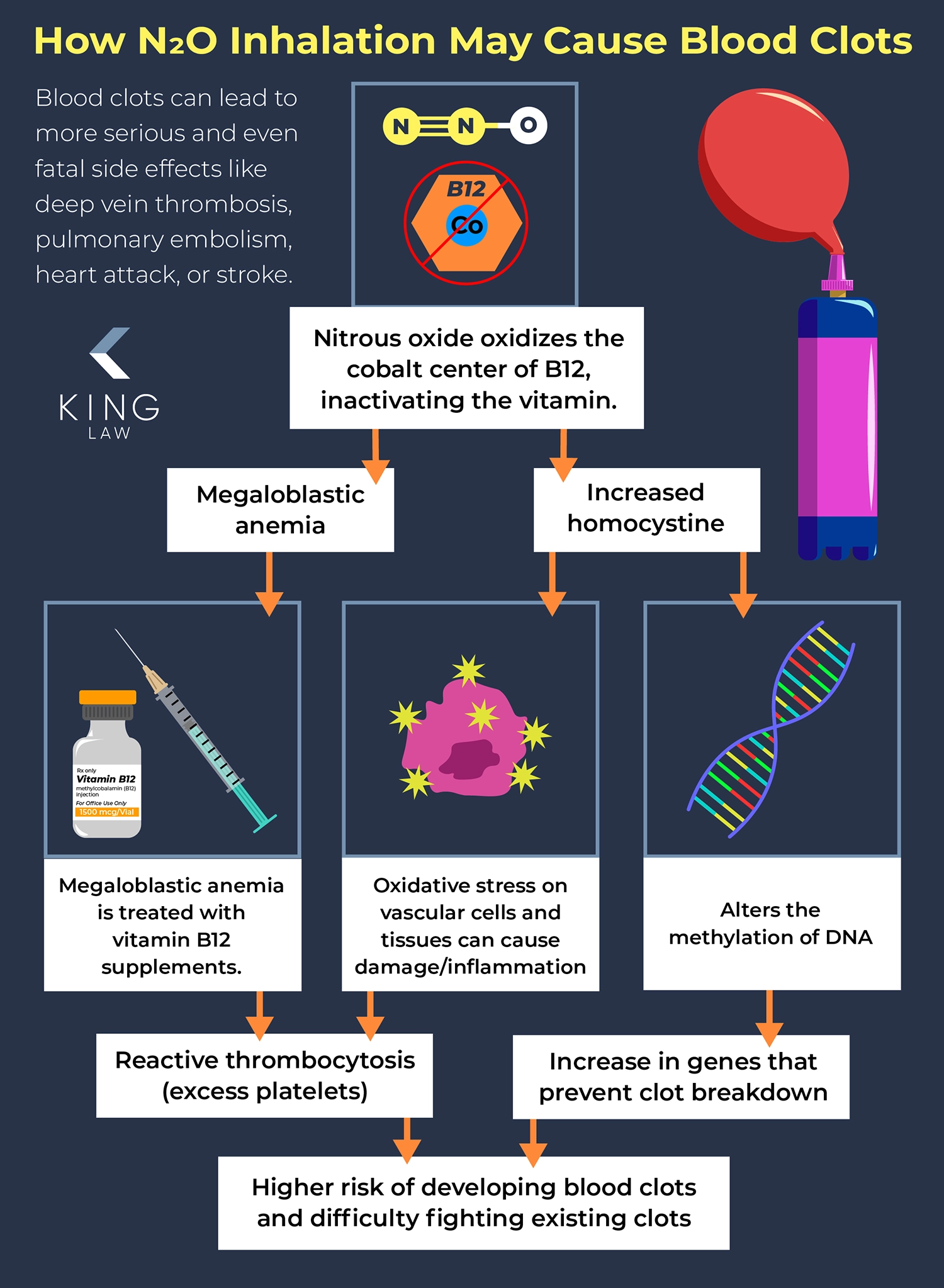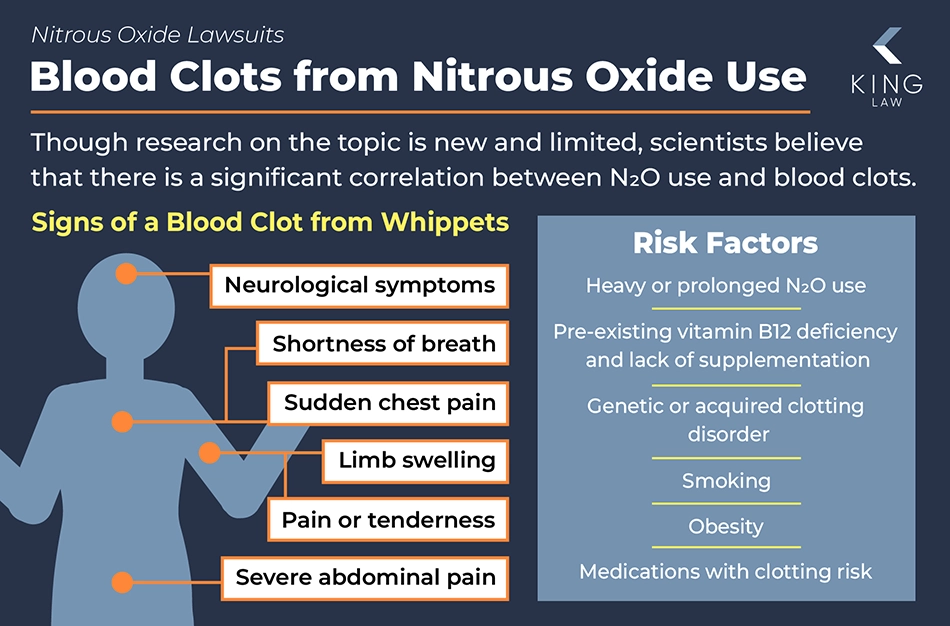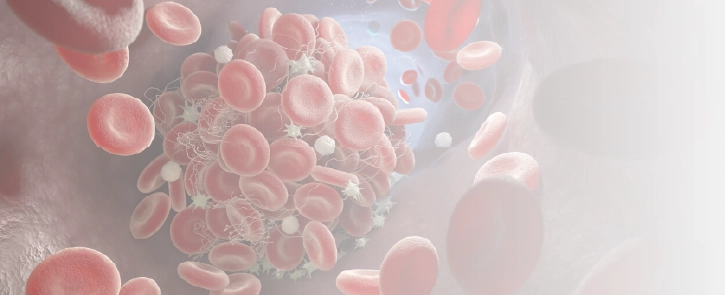Complete the form below to see if you qualify for a Whip-It Lawsuit

Studies show inhaling whippets can increase a person’s risk of blood clots, including pulmonary embolisms. Many teens and young people believe whippets are mostly harmless and inhale the drug for its euphoric effects. However, medical reports indicate that chronic whippet use may increase a person’s chances of developing blood clots (i.e., a thrombosis) even if that person is healthy or young.
Blood clots can be life-threatening, leading to stroke, heart attack, pulmonary embolism, and limb amputation. In some instances, a blood clot may prove fatal.
This article will explore why there is growing concern over the potential link between whippets and blood clots, as well as risk factors for people using this recreational drug. The article will also cover prevention strategies and what to do if you or someone you love has been diagnosed with a whippet-related clot.
About Whippets and Blood Clots:
Can Inhaling Whippets Cause Blood Clots?
How Do Whippets Cause Blood Clots?
Documented Blood Clot Cases Linked to Whippet Use
Risk Factors That Increase Blood Clot Risk in Whippet Users
How Common Are Blood Clots from Whippet Use?
What Are the Signs of a Blood Clot After Whippet Use?
How to Reduce the Risk of Blood Clots in Whippet Users
Have You Experienced Blood Clots From Whippets?
Can Inhaling Whippets Cause Blood Clots?
As documented by the U.S. Food and Drug Administration (FDA), the recreational use of nitrous oxide, often referred to as whippets, can cause severe harm, including blood clots. Whippets likely increase someone’s risk of blood clots because nitrous oxide affects vitamin B12 absorption and high homocysteine levels, which can lead to artery damage and blood clots.
A case report published in the World Journal of Clinical Cases in 2019 found that, although nitrous oxide use has not been widely studied previously, evidence supports a correlation between its use and blood clots. This study found the correlation was strongest for deep vein thrombosis (DVT) and pulmonary embolism, even in users with no prior history of clotting problems.
It is well-documented that excessive N2O use can have many negative effects on the nervous system and brain activity. Inhaling whippets can inactivate vitamin B12, disrupt homocysteine metabolism, and inhibit methionine synthase.
One of the side effects of nitrous oxide is that it affects the body’s metabolic processes. These changes to the body’s metabolic system can damage the vascular system and cause a thrombosis (blood clot). Although the risk of blood clots increases with heavy or prolonged nitrous oxide use, cases have been reported in moderate users as well.
What Types of Blood Clots Can Whippets Cause?
Inhaling nitrous oxide recreationally can lead to an increased risk of pulmonary embolism, deep vein thrombosis, and intracranial thrombus. Each one of these is a type of blood clot that can be very dangerous or even life-threatening.
Here is a description of some of the clots associated with whippet (nitrous oxide) use:
- Pulmonary embolism: A type of blood clot that stops blood flow to an artery in the lung. These clots can be fatal.
- Deep vein thrombosis (DVT): A type of blood clot that forms in a deep vein, usually in the leg or pelvis. These clots can become dislodged and lead to a pulmonary embolism.
- Intracranial thrombus: A type of blood clot that forms in the brain. This can lead to a stroke.
How Do Whippets Cause Blood Clots?
Whippets carry many risks, including increasing the risk of blood clots. According to a study published in Case Reports in Medicine, nitrous oxide abuse can lead to vitamin B12 deficiency and hyperhomocysteinemia. These conditions can lead to peripheral neuropathy (nerve damage) and hypercoagulability, making people more susceptible to blood clots.
Recreational use of whippets can lead to subacute combined degeneration (SACD) and thrombosis due to the drug’s ability to inactivate vitamin B12. Whippet use can damage blood vessels, increasing the potential for clots. These biochemical changes can make a chronic whippet user more susceptible to clots. If a clot forms, the biochemical changes can also make it harder for the body to break down clots, increasing the risk of persistent or recurrent thrombosis.
Vitamin B12 Inactivation and Functional Deficiency
The vitamin B12 deficiency caused by nitrous oxide is believed to be linked to the toxin’s irreversible oxidation of the vitamin’s cobalt atom (cobalamin). This process renders vitamin B12 inactive, causing a deficiency in some chronic whippet users. In some instances, a person’s serum B12 levels appear normal, but the “functional deficiency” remains, preventing their body from properly accessing and using B12. A lack of available B12 can prevent methionine synthase from converting homocysteine to methionine. This process can occur quickly in individuals who abuse nitrous oxide regularly.
Homocysteine Accumulation and Its Impact on Blood Vessels
Studies show that there are multiple mechanisms by which whippet abuse can lead to blood clots and an elevated risk of stroke. According to a case presented in Cureus, nitrous oxide use can lead to a condition called hyperhomocysteinemia. The condition occurs when there is a buildup of homocysteine in the bloodstream. The buildup of this amino acid can cause oxidative stress, which may cause inflammation and damage blood vessel walls, making the person more prone to clotting.
Pro-Thrombotic Effects on the Endothelium, Platelets, and Coagulation
High homocysteine levels caused by nitrous oxide abuse can activate platelets, increasing the risk of thrombosis. The damage caused by elevated levels of homocysteine can weaken blood vessels, increasing the potential for platelets to adhere together and for clots to form.
Impaired Fibrinolysis and Persistent Clot Formation
According to a study published in the Journal of Clinical Investigation, hyperhomocystinemia can make it more challenging for the body to break down clots. Findings from the study highlight how elevated homocysteine levels can impair fibrinolysis, the process by which the body breaks down fibrin in blood clots, helping them to dissolve. The impairment of this process can contribute to vascular disease and persistent clot formation.

Documented Blood Clot Cases Linked to Whippet Use
Medical reports from around the world highlight the potential link between whippet (nitrous oxide) use and the formation of potentially life-threatening blood clots. These clots can develop in teens and young adults who had no prior history of clotting problems. Clinical cases show that venous and arterial clots have been observed in unusual sites. In many instances, nitrous oxide users also presented with neurological symptoms related to vitamin B12 deficiency and nerve damage.
Venous Thromboembolism (Deep Vein Thrombosis & Pulmonary Embolism)
Medical cases now show that nitrous oxide users may be at an increased risk for deep vein thrombosis and pulmonary embolism. A case reported in the World Journal of Clinical Cases showed that a 29-year-old man who admitted to chronic recreational nitrous oxide use was hospitalized for severe chest pain. Tests concluded that he had developed a pulmonary embolism, deep vein thrombosis, and hyperhomocysteinemia. The study indicates that nitrous oxide abuse may be linked to elevated homocysteine levels, which are known to contribute to clotting events.
Arterial Thrombosis (Heart Attack, Stroke, Limb Ischemia)
According to a case report published in Cureus, a 32-year-old man with an extensive history of nitrous oxide abuse presented with a large ischemic stroke. It is believed that nitrous oxide intake oxidizes vitamin B12, inhibiting methionine synthase and causing hyperhomocysteinemia. This condition is a known risk factor for blood clots, cardiovascular disease, and stroke.
Unusual Site Thromboses (Brain, Abdominal Veins)
Unusual site thromboses, such as in the brain or abdominal veins, are also showing up in patients who use N2O recreationally with no prior history of clotting issues. In a recently published case, a 19-year-old woman who used up to 2,880 grams per day of nitrous oxide presented with a cerebral venous thrombosis with intracerebral hemorrhage. It is believed that this may have…
Nitrous oxide users and their loved ones are encouraged to seek emergency medical attention for any whippet-related complications, such as seizures, dizziness, splenic infarctions, or swelling of the intestines.
Risk Factors That Increase Blood Clot Risk in Whippet Users
Several risk factors may increase the risk that a whippet user may develop a clot. Increased use of nitrous oxide among teens and young adults has drawn concern from health officials who are seeing increased reports of thrombosis.
Risk factors that may increase the blood clots in whippet users:
- Heavy or prolonged nitrous oxide use
- A preexisting vitamin B12 deficiency
- Lack of vitamin supplementation
- A genetic or acquired clotting disorder
- Smoking
- Obesity
- Use of medications that also increase the risk of clotting
It is important to note that nitrous oxide use may also cause nerve damage or neuropathy, which may further increase a user’s risk of developing a clot. Reduced mobility related to neuropathy can contribute to conditions that may cause hypercoagulability and venous stasis.

How Common Are Blood Clots from Whippet Use?
While the exact incidence rates are unknown due to many patients’ unwillingness to admit to nitrous oxide use, there is some evidence that a concerning number of patients with N2O have clots. According to one study, 8% of nitrous oxide users had unprovoked venous thromboembolism (VTE).
Although medical evidence suggests that the risk is highest in heavy or chronic users of nitrous oxide, it has been documented in moderate users with no prior clotting history. This means that the potential for harm exists in anyone inhaling the toxin.
What Are the Signs of a Blood Clot After Whippet Use?
People who use whippets (and their family and friends) should monitor themselves for signs of blood clots. Blood clots and related conditions can be life-threatening and should be diagnosed and treated promptly.
Signs of a blood clot related to whippet use:
- Limb swelling: Blood clots can cause swelling in a limb, most commonly in the leg.
- Pain or tenderness: Clotting may present with targeted pain or tenderness, particularly when walking or standing. The site may also feel warm to the touch or have redness.
- Sudden chest pain: If the clot has traveled to the lungs, referred to as a pulmonary embolism, it may cause sudden chest pain.
- Shortness of breath: A pulmonary embolism can result in shortness of breath and may prove fatal if left untreated.
- Neurological symptoms: Blood clots caused by whippet use can cause neurological problems such as difficulty speaking, weakness, or facial drooping, particularly if the clot caused a stroke.
- Severe abdominal pain: If a clot has formed in the abdomen, it may cause severe pain, typically in the lower abdomen.
Symptoms of blood clots are not the only symptoms people who use nitrous oxide should watch for. Inhaling whippets has a range of side effects that can present with different symptoms.
How to Reduce the Risk of Blood Clots in Whippet Users
There are several ways for people who use whippets to reduce the risk of blood clot formation. Primarily, stopping the use of nitrous oxide can significantly lower the risk. Heavy or chronic users are encouraged to seek professional help and discuss strategies for quitting.
Ways to reduce the risk of blood clots in whippet users:
- Cease using nitrous oxide
- Have a doctor monitor vitamin B12 levels
- Mobilization to help circulation
- Anti-clotting medication
Many health professionals warn that patients with a genetic or acquired B12 deficiency or a clotting disorder are advised to discontinue using nitrous oxide immediately to minimize the risk of blood clots. Additionally, people who take estrogen-based medications, which may themselves increase the clotting risk, should also avoid using nitrous oxide altogether.
Have You Experienced Blood Clots From Whippets?
Individuals who have suffered a blood clot after using Whippets are encouraged to contact an attorney as soon as possible, after receiving proper care from a physician. A lawyer can help determine eligibility for filing a legal claim. Nitrous oxide victims should document their nitrous use and any details of their clotting diagnosis to help strengthen their case. The attorney may request medical records and proof of whippet purchase to help them evaluate the claim.
Speak With a Whippet Lawyer Today
If you were diagnosed with a blood clot after using whippets, you should contact an experienced attorney. It is important to act fast, as these personal injury cases are governed by a statute of limitations. Failure to file a claim within the statute of limitations could result in the case being denied. Whippet lawsuits can help individuals cover medical expenses and may provide compensation for lost wages, pain and suffering, and more. Contact King Law today to schedule a free consultation and understand if you meet the criteria to file.

